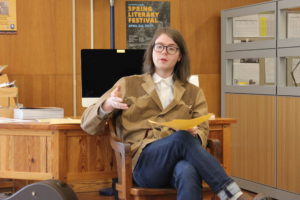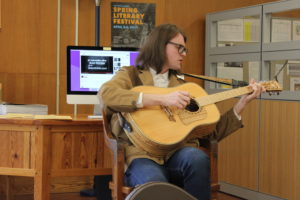
James Woodburn performing “Barbara Allen”. Photo by Alec Simkiss.
“(Ballads are) a way for me to connect with a world that I was told a lot about by relatives of mine…” said James Woodburn, Asheville local and musician. “…but funnily enough, I feel closer to it than the stuff you hear on the radio today. It’s ephemeral, it’s like words in stone that seem to last forever.”
James Woodburn is from Asheville, N.C. He was raised by his great grandmother who sang all the time, which inspired him to want to do music. Woodburn is a work study employee and junior at Western Carolina University. He is an experienced storyteller, and asked if he could perform when the current exhibit opened up.
“I really love Woodie Guthrie, which led me to Bob Dylan. I was really inspired by the way they combined guitar and a kind of spoken singing style,” commented Woodburn.
The Mountain Heritage Center advertised for a performance on March 23 at 5-6 P.M. for a ballad known as “Barbara Allen” performed by James Woodburn (with a typo calling him Washburn) and brought attention to the aspiring musician and his knowledge of ballads. The venue itself is small and had about 10 people attend.
“Barbara Allen” was performed due to the Heritage Center’s current exhibit, focusing on Horace Kephart. While it isn’t known for sure, “Barbara Allen” is a song that Kephart likely might have heard when he first came to the Smoky Mountains.
There was only one ballad performed at the Center and the event mostly was an overview of the history of ballads. According to Woodburn, ballads served as mass media before the printing press and even after until the 19 century with wandering minstrels as well as courtly poetry. Ballads are a derivative of folk music that passed through generations that shaped and shifted with the times, which were often grim.

James Woodburn giving an overview of “Barbara Allen” and the history of ballads. Photo by Alec Simkiss.
“’Barbara Allen'” is a typical tragic love ballad…these people saw a lot of grimness in their lives, they saw their husbands and wives dying, children dying young,” Woodburn solemnly explained. “…Lost love and death in these ballads were a crystallization of what these people went through in their time. Illness was wide spread. People would go to sea, disappear, and never be seen again. It wasn’t like today where we’re in constant communication with one another, (back then) people could just disappear from your life very unexpectedly.”
However, Woodburn emphasized ballads were often sung prose poetry, and sometimes were pure nonsense in their material, and could mean whatever a listener might want them to.
Woodburn chose the ballad due to its beauty he felt withstood the test of time, as “Barbara Allen” is about a man who has fallen in love with a woman who doesn’t return his feelings and dies of heartbreak. Barbara Allen realizes she loves him as well all too late, and passes away soon after. The hope at the end is that perhaps in another life they would find each other and fall deeply in love.

James Woodburn performing “Barbara Allen”. Photo by Alec Simkiss.
The ballad evoked some strong emotions in the audience. The song, sung accompanied by an acoustic guitar in a talky sing song way, even though never heard by most of the audience caused feelings of nostalgia and even moved some to almost a few tears.
“Even though I had never heard it [Barbara Allen] before, it made me feel nostalgic and nearly at tears at one point ‘cause it touched me quite a bit…I think the theme of the ballad with its hopeless romance was relatable and in a way almost inspiring to hear,” said Holly Hurding-Jones, WCU junior.
“I loved the performance. I’m impressed with Woodburn’s knowledge, and hope to hear more from him at some point…” said Sarah Elizabeth Berkey, a ballad singer herself who met, knew and learned from another famous ballad singer, Jean Ritchie. “I know a lot of the old mountain ballads and learned from Jean Ritchie herself…I saw an ad in the newspaper where (Woodburn) was going to be talking about ballads (at WCU) and I came here to be around someone who loves ballads the way I do. He did an excellent job. He didn’t say anything I disagreed with.”
“There was a line in the song that talked about “Scarlet town” which was actually based off a real town called “Scarborough town” and “Scarborough Fair” is a ballad I’m actually aware of, so there was a real connection there.” Hurding-Jones spoke of her relating to the performance because of her English background, realizing how deep the connection between American and English culture go.

Woodburn smiling for the camera for his first performance at the Heritage Center. Photo by Alec Simkiss.
Woodburn spoke on why he performed ballads and why he wants to play in this particular genre.
“A lot of the material that I play I find to be more emotionally cutting and deeper than a lot of music today,” Woodburn mentioned. “Not saying that modern music can’t, but I find (folk music) has a lot of poignancy that is really rivaled today by say, hip hop and rap.”
Woodburn clarified his position on comparing the genres, showing respect and love for these genres.
“Like with rap, a lot of the people who sing (folk) music had lives that were difficult and hard and a lot of sorrow to overcome in their lives, and the music reflects that because all art is basically a mirror of the lives of whoever’s composing it.”


